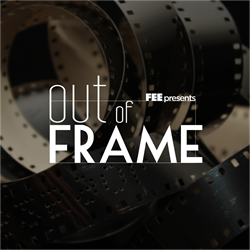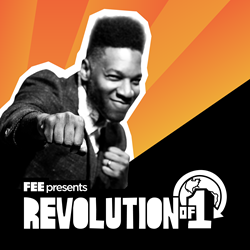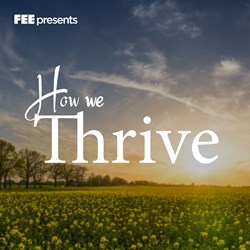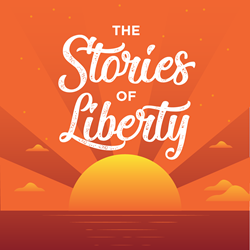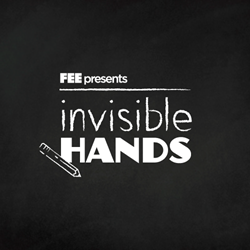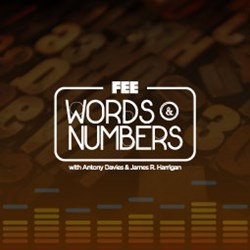INT. STUDIO - DAY
A young, energetic man, KEVIN LIEBER, stands in an open bright space behind an attractive desk, next to FIONA the puppet.
Pedestals and shelves are arranged behind them with a series of PROPS — a giant pencil, busts of important economists, globes and other common indicators of education & economics.
There are more objects relevant to economics on the desk.
We also see a small GREENSCREEN "blackboard" and an attractive ILLUMINATED SIGN with the Foundation for Economic Education logo on it.
SCENE 01: INTRODUCTION
We see a quote on the blackboard in the background. It reads:
“This is not a dispute about whether planning is to be done or not. It is a dispute as to whether planning is to be done centrally, by one authority for the whole economic system, or is to be divided among many individuals.”
– F. A. Hayek
KEVIN
(to camera)
Hi! Kevin here. Welcome to "Invisible Hands", the series that makes economics easy and helps you see the beauty of trade and cooperation. With puppets!
(turning to Fiona)
Speaking of... Hey Fiona. Let's talk about how markets and economics work in the real world.
FIONA
That's a good idea!
(sarcastically)
Who wants to talk about alternate universe economics anyway?
KEVIN
Well, I do... But we're doing something important here!
FIONA
Oh, okaaaay.
SCENE 02: WHAT ARE INSTITUTIONS?
PROFESSOR FERGUSON enters.
PROFESSOR
As I’m sure you remember, people respond to incentives. If we change the rules and institutions in society, people will probably make different choices. So this stuff really matters.
FIONA
Alright, I got that. But what does that really mean? What kinds of rules and institutions are we talking about?
TEXT on the blackboard appears, reading:
“Good institutions cannot usually be imposed from above: that way they are oxymorons.”
― Matt Ridley
KEVIN
Well, think about this. We've already talked a lot about the benefits of voluntary exchange, right? Sound economic thinking can help us understand which institutions promote more wealth-creating activities like trade & entrepreneurship--and which don't.
PROFESSOR
That's right. If we want to make the world a better place, we need to think about how we can best achieve social cooperation among countless strangers in a world of scarce resources.
FIONA
That seems like a really big job.
KEVIN
It is.
PROFESSOR
And it's made even more challenging by the incredible diversity of humanity and nature, by always changing individual preferences, and by our own imperfect knowledge. So, how we confront these challenges largely depends on society’s rules.
SCENE 03: GOOD INSTITUTIONS
KEVIN
So... What rules do you think might help make us better off?
FIONA
Hmm. I'm not sure. I guess the first thing would be making sure that everybody is able to trade with each other easily and freely.
(pausing to think)
I suppose that means that the rules need to be clear and simple to follow... And they can't just change for no reason... And we'd need to stop people from stealing or cheating.
KEVIN
You know... What you're talking about are two really important ideas called "Property Rights" and "Rule of Law".
TEXT appears on screen reinforcing the two ideas.
KEVIN
Let's start with Rule of Law.
SCENE 03: RULE OF LAW
FIONA
Ok. Big fan. I loved him in The Holiday.
KEVIN
Not Jude Law. Rule of Law!
(shaking his head)
I’m talking about a system of impartial rules that are applied uniformly to everyone. It's about having a society where everybody is treated as an individual deserving of equal respect and dignity under the law.
PROFESSOR
As opposed to a system where rulers and lawmakers arbitrarily decide that the rules of society only apply to some people.
FIONA
Like Venezuela or North Korea?
KEVIN
Yeah. Even just thinking about it as a moral issue, a fair legal system should respect people's rights equally.
FIONA
Of course.
KEVIN
But rule of law is important for practical reasons, too.
FIONA
Like what?
KEVIN
For one thing, a few simple, stable rules and expectations are essential for economic growth. Arbitrary and overly complicated rules are confusing, unfair, and make it impossible for people to plan ahead or even trust each other. Plus when people in power can make up the rules as they go, it's pretty much an open invitation for corruption.
FIONA
Yeah, that sounds pretty bad.
KEVIN
The worst.
SCENE 04: BARRIERS TO ENTRY
On the blackboard, we see VIDEO CLIPS of war torn, impoverished countries, like Sierra Leone, Venezuela, and North Korea.
PROFESSOR
It really is. Excessive laws and regulations can actually introduce unnecessary chaos and conflict into society. The more barriers government creates, the more difficult it is for aspiring entrepreneurs to pursue productive ventures, and for workers to find the job opportunities created by those businesses.
FIONA
Wait, so rule of law affects my ability to get a job?
(comically)
Whaaaaaaaaat?? Looks like I’m applying for that graduate degree.
PROFESSOR
Now you’re speaking my language!
(back to business)
Overly burdensome regulations and licensing laws, corruption, and regulatory uncertainty makes entrepreneurship difficult.
FIONA
So what you're saying is, we should be really thoughtful about the kinds of rules we make, so it’s possible for people to live out their dreams.
KEVIN
That's right. And as for the specific kinds of rules we need, one of the most important is property rights.
FIONA
That just means that people don't steal each others' stuff, right?
KEVIN
Well... That's definitely part of it. It all kind of comes back to the idea of scarcity.
SCENE 05: PROPERTY RIGHTS
We see a VIDEO CLIP from the Fundamentals episode on the blackboard behind everyone.
PROFESSOR
The fact of scarcity creates the possibility of conflict when two or more people want control over the same set of resources.
FIONA
We could just get them to agree...
KEVIN
That's harder than it sounds. Remember, values are subjective and people often want to do totally different things with the same resources. So whose goals will we pursue? Who gets to decide and how do we settle the conflicts that are bound to happen?
(beat)
For example, we may disagree on the best way to use your car. What if I want to use it for a demolition derby?
FIONA
Uh... No. I need my car to get to class!
We see a CUTAWAY of Fiona is running frantically across the frame.
FIONA
Can… Not… Be….. Late...Again!
Back in the studio, Kevin continues.
KEVIN
I bet you do. But you only get to make those decisions for yourself if we respect each others' property. And by showing respect for your property, I'm also showing respect for you as a person.
FIONA
By acknowledging my right to decide what happens with my stuff, you're saying I don’t get to tell you what to do with yours.
PROFESSOR
That's right. A system of property rights can help diverse groups of individuals effectively cope with disagreements about how resources should be used. We do this by establishing clear rules on how individuals can come to own property. That means you have the authority to use, modify, exchange, and dispose of your property however you want – so long as you don’t interfere with others’ rights to the same.
FIONA
Like with my car, the fact that it's my property means you don't get to smash it without my permission.
An IMAGE of FIONA'S CAR appears on the blackboard.
KEVIN
Yep. You get to decide what happens with it. You can loan it to me, share it with someone else, sell it or trade it away, or just keep it for your own use... It's your choice.
SCENE 06: GOOD & BAD INSTITUTIONS
PROFESSOR
Property rights also make planning possible. Lacking them, people are discouraged from innovating or producing goods and services since they have no confidence that they'll be able to keep what they earn.
KEVIN
And we see this happen around the world in countries with weak property rights and rule of law.
FIONA
(nodding)
I see, I see. Do go on.
PROFESSOR
Both theory and history have overwhelmingly shown that the most efficient means of coping with scarcity in society is the institution of private property.
KEVIN
Property Rights enable us to care for both ourselves and each other as human beings.
FIONA
That's pretty heavy.
KEVIN
It is... Societies are shaped by the ideas they embrace.
SCENE 07: SOCIETIES ARE SHAPED BY THEIR IDEAS
TEXT scrolls by on the blackboard:
“Honesty, integrity, courage, productivity, long-term planning, individual responsibility, ambition, entrepreneurship”
KEVIN
A society that embraces values like honesty, integrity, individual responsibility, and entrepreneurship creates more jobs, produces more wealth, and allows people to exercise their creative talents.
FIONA
Ok.
Fiona pauses for a moment to consider.
FIONA
So incentives are created by the rules and institutions we accept. And the good ones are going to make people wealthier and better off.
KEVIN
Totally.
FIONA
But... Without rule of law and property rights, people aren't rewarded for their good work. It’d be like taking a test and then having the professor change everybody’s grades arbitrarily. Why I would I study?
PROFESSOR
Good question! Without the right incentives, you probably wouldn't study. You'd probably choose the easiest life possible! The same is true for everybody else--without good rules in society, people won't have the incentives to create businesses and make things for themselves and other people.
KEVIN
Good rules and institutions, like respect for property rights, are the foundation of a healthy market economy.
FIONA
And that makes for a better life for us all!
KEVIN
(to camera)
If you have questions or just want to know more leave a comment on this video -- and check out courses.FEE.org for tons of additional information. See you next time!
About this show
Popular YouTube host Kevin Lieber (VSauce2) hosts this informative and entertaining video series designed to introduce key concepts of economics to younger audiences through credible arguments, comedy... And puppets!
